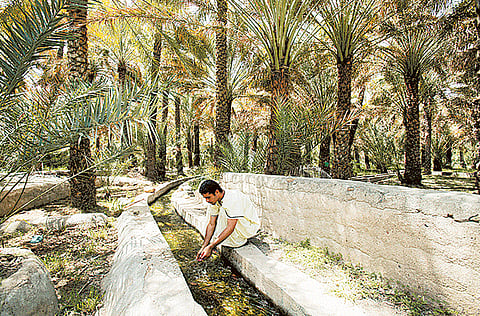Abu Dhabi groundwater to run out in 50 years
Groundwater reserves in UAE being used up more than 20 times as fast as they can be recharged

Abu Dhabi: Abu Dhabi’s aquifers including those with 10,000 year-old water reserves are expected to run out in 50 years if the current rate of water extraction continues, a senior official told Gulf News.
“It’s estimated that Abu Dhabi alone uses more than 3 billion cubic metres of water per year — more than enough to fill 1.2 million Olympic-sized swimming pools,” said Dr Mohammad Yousuf Al Midfa, the Executive Director of the Integrated Environment Policy and Planning Sector at Environment Agency-Abu Dhabi (EAD).
Today, in terms of water usage, groundwater contributes 65 per cent of the total water consumed in Abu Dhabi. Desalinated sea water contributes 30 per cent and recycled water makes up for the rest, he said.
Despite being situated in the Arabian desert, Abu Dhabi is blessed with underground water reservoirs, or groundwater aquifers, near Al Ain in the Eastern Region and Liwa in the Western Region.
The Liwa Aquifer contains ‘fossilised’ water from 10,000 years ago, the time of the last Ice Age. The aquifers in the Eastern Region have benefitted from more frequent recharging due to precipitation in the nearby Hajar mountains.
“Both aquifers are at risk, mainly because we extract so much for agriculture and forestry,” the Al Midfa said.
At the current rate of consumption, the country is utilising underground water resources more than 20 times as fast as they can be recharged. And this situation is on likely to be exacerbated with projections indicating that Abu Dhabi’s population and economy are likely to triple in the next 15 years.
The usable groundwater resources in the most heavily irrigated areas will be depleted sooner than 50 years (if the current extraction rate continues), the official said.
“If we take no action now, our usable groundwater aquifers will be gone… forever.”
Preserving groundwater for future generations is an imperative,” Al Midfa said.
“We need these aquifers for our own safety and security — for both food security and water reserve for future generations.”
Groundwater in Abu Dhabi is almost exclusively used to irrigate agriculture, forestry, and amenities such as parks and greenways.
“Groundwater resources are undoubtedly critical for food security, the natural ecosystem, and our quality of life.”
However, there is a significant need to recalibrate the management of water that is used for agricultural and forestry irrigation.
“We need to optimise our use of groundwater,” Al Midfa said.
The EAD, which oversees groundwater resources and consumption through a variety of programmes, is promoting the concept of a water budget for the emirate.
“It means we have to think carefully about how we allocate water and that by allocating more water to one sector we may have to reduce the allocation to another sector, in the same way as financial budgets are allocated. This unprecedented concept for the region was advocated during the International Water Summit in Abu Dhabi,” Al Midfa explained.
He said encouraging behavioural change at the individual level is the answer.
“Any effect can be brought about only by starting at the grassroots — through change in individual behaviour, that is you, me, and our neighbours committing to a more sustainable water future!”
It is ironic that with less than 100 mm rainfall per year, the Gulf states have the highest per capita water consumption in the world. This regional paradigm must change, the official said.
Sign up for the Daily Briefing
Get the latest news and updates straight to your inbox

